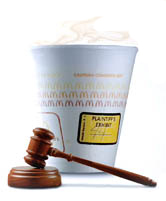 Everyone has heard about the McDonald’s hot coffee case where Stella Liebeck was scalded with third degree burns. And almost everyone has an opinion. Every so often, someone knows the actual details. Most though, just know that some lady spilled hot coffee on herself and sued McDonalds for millions. A Google search for hot coffee Stella Liebeck turns up over 11,000 hits, and hot coffee lawsuit turns up 60 million.
Everyone has heard about the McDonald’s hot coffee case where Stella Liebeck was scalded with third degree burns. And almost everyone has an opinion. Every so often, someone knows the actual details. Most though, just know that some lady spilled hot coffee on herself and sued McDonalds for millions. A Google search for hot coffee Stella Liebeck turns up over 11,000 hits, and hot coffee lawsuit turns up 60 million.
Now a movie has been made called, appropriately enough, Hot Coffee. And this movie explains why you know about this suit, why it’s part of the discussion over the civil justice system, and how it was used (and misused) for propaganda purposes. This is the blurb from the Hot Coffee site (which also has a trailer for the film):
Seinfeld mocked it. Letterman ranked it in his top ten list. And more than fifteen years later, its infamy continues. Everyone knows the McDonald’s coffee case. It has been routinely cited as an example of how citizens have taken advantage of America’s legal system, but is that a fair rendition of the facts? Hot Coffee reveals what really happened to Stella Liebeck, the Albuquerque woman who spilled coffee on herself and sued McDonald’s, while exploring how and why the case garnered so much media attention, who funded the effort and to what end. After seeing this documentary film, you will decide who really profited from spilling hot coffee.
Why write about this now? Because the documentary was selected today to play at the Sundance Film Festival. The festival picked just 16 films out of 861 submissions.
The Sundance site had this blurb on the film:
(Director: Susan Saladoff) Following subjects whose lives have been devastated by an inability to access the courts, this film shows that many long-held beliefs about our civil justice system have been paid for by corporate America.
The incident occurred in 1992, 18 years ago, and this one case still fuels debate. Why? It may because there are continuing attempts by the corporate world to gain immunity for negligent acts by calling it tort “reform.” And the way the argument is made is by looking for outlier suits, and trying to use those outliers as a means of changing the system as a whole. (Whether the McDonald’s case is an outlier will depend on your own viewpoint after reading the facts, but that is how “reform” politics fundamentally works.)
The debate rages on.
Eric, in every single jury case, jurors ask about the “McDonalds coffee case.” You know that we as plaintiff’s attorneys must then explain why Stella never saw the kind of money that a jury determined she was supposed to receive. After post-trial motions and appeals, the award was whittled down to a fraction of what the jury awarded her.
You don’t hear that talked about in the media, even 18 years later.
The reason “hot coffee lawsuit” turns up sixty million hits is, in probably equally large part, that “Hot Coffee” was a Grand Theft Auto cheat which allowed the player to simulate pornographic acts. It was the subject of a notoriously stupid class action settlement, to which our friend Ted Frank successfully objected.
It is nice to see a film being made about the Liebeck case, which for better or worse has become a piece of American folklore.
I bring up the suit every time when I’m picking a jury. I figure I might as well because they are thinking about it anyway, and this way I can see what kinds of reactions they have.
Do jurors treat it as an outlier or as “the usual?”
Pingback: Linkworthy – New York Personal Injury Law Blog
Pingback: Hot Coffee Tonight – New York Personal Injury Law Blog